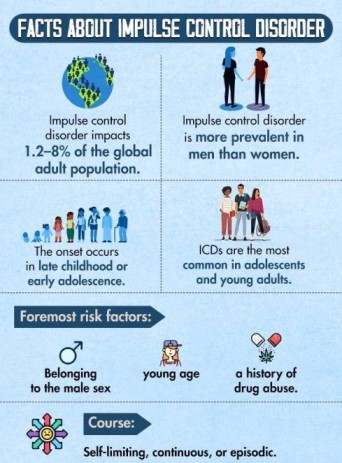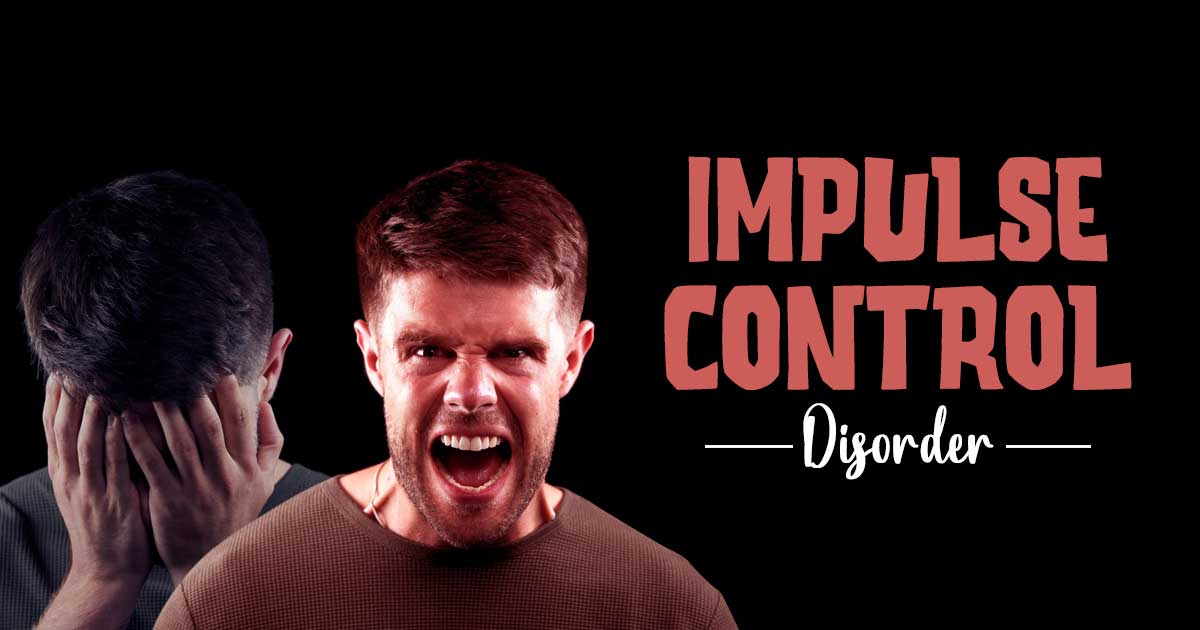Impulse control disorder involves a mental health disorder in which people uncontrollably experience and execute dangerous urges and impulses.
What Is Impulse Control Disorder?
Impulse control disorder (ICD) is a mental health condition in which a person experiences chronic difficulty in resisting temptation or refraining from certain impulsive behaviors. Such obsessive urges and behaviors are excessive and/or harmful to oneself or others, causing significant impairment in social and occupational functioning, as well as legal and financial difficulties
ICD has been recognized in the American Psychiatric Association’s Diagnostic and Statistical Manual of Mental Disorders (DSM-5) as one of the disruptive, impulse-control, and conduct disorders. Some common impulse control disorder examples may include:
- Obsessive-compulsive disorders (OCD)
- Pathological gambling (PG)
- Kleptomania
- Trichotillomania (TTM)
- Intermittent explosive disorder (IED)
- Oppositional defiant disorder (ODD)
- Pyromania
- Pathological skin picking
- Compulsive sexual behavior
- Shopping addiction
- Internet addiction
- Eating disorders 1 Devoe, D. J., Anderson, A., Bahji, A., Singh, M., Patten, S. B., Soumbasis, A., Ramirez Pineda, A., Flanagan, J., Richardson, C., Lange, T., Dimitropoulos, G., & Paslakis, G. (2022). The Prevalence of Impulse Control Disorders and Behavioral Addictions in Eating Disorders: A Systematic Review and Meta-Analysis. Frontiers in Psychiatry, 12. https://doi.org/10.3389/fpsyt.2021.724034
- Compulsive hobby participation
Read More About Trichotillomania Here

Signs Of Impulse Control Disorder
The impulse control disorder symptoms vary according to age. However, certain symptoms pertain to all age groups 2 Lopez, A. M., Weintraub, D., & Claassen, D. O. (2017). Impulse Control Disorders and Related Complications of Parkinson’s Disease Therapy. Seminars in neurology, 37(2), 186–192. https://doi.org/10.1055/s-0037-1601887 , including:
- Engagement in harmful or dangerous behavior
- Compulsive and obsessive thought patterns
- Compulsive lying
- Poor social skills
- Social isolation
- Inability to control impulses
- Low self-worth and self-esteem
- Random episodes of emotional detachment and outbursts
- Experiencing irritability, agitation, anxiety, etc.
- Acting out aggressively or violently against people, animals, objects, and/or property
Impulse Control Disorder In Children And Adolescents
The early impulse control disorder symptoms in children manifest in frequent stealing, lying, talking back to adults, and violating rules (such as running away or skipping school at an early age). Among adolescents, ICDs frequently co-occur with other psychiatric disorders, particularly ADHD and mood and drug use disorders. They may also engage in:
- Skin-picking
- Nail-biting
- Persistent conflict with their peers
- Adjustment issues at school or at home
- Emotional outbursts (like classroom outbursts)
- Compulsive internet use
- Compulsive video game playing
- Disordered eating
- Poor academic performance, dropping out of school, etc.
Impulse Control Disorder In Adults
Untreated ICDs can be extremely debilitating for adults and the elderly. The common symptoms of impulse control disorder in adults include:
- Deficiencies in social processing and problem-solving
- Engagement in conflict and violence
- Hypersexuality
- Uncontrolled gambling
- Compulsive shopping
- Pyromania or intentionally setting fires
- Internet addiction or out-of-control usage
- Hypersexuality
- Frequent psychiatric hospitalizations and functional difficulties
Impulsive Behavior Vs Impulse Control Disorder
Typically, an impulsive action results from the tension that has built to the point where the person can no longer resist it. The consequences as well as the immediate sense of relief from acting on an impulsive behavior are short-lived.
An impulse control disorder, on the other hand, occurs when a person falls prey to his/her pathological impulses and such dysfunctional behavior and thought patterns disrupt his/her daily functioning.
Types Of Impulse Control Disorder
Research 3 Fariba, K. A., & Gokarakonda, S. B. (2022). Impulse Control Disorders. PubMed; StatPearls Publishing. Available from: https://pubmed.ncbi.nlm.nih.gov/32965950/ divides the common types of this disorder into several categories 4 Fariba, K. A., & Gokarakonda, S. B. (2023). Impulse Control Disorders. PubMed; StatPearls Publishing. Available from: https://www.ncbi.nlm.nih.gov/books/NBK562279/#:~:text=%5B4%5D%20Those%20falling%20under%20the :
1. Oppositional defiant disorder (ODD)
Oppositional defiant disorder (ODD) is a negativistic behavioral and emotional disorder in which an individual displays a continuing pattern of uncooperative, defiant, and hostile behavior toward people in authority. ODD is marked by disinhibition and negative emotionalism. It is more common in children, with the onset happening as early as before 13 years of age.
Read More About Oppositional defiant disorder (ODD) Here
2. Conduct disorder (CD)
The spectrum of conduct disorders involves persistent and critical patterns of misbehavior directed at breaking rules and doing harm to others. It is more common in adolescents but, if left untreated, in adulthood, it turns into antisocial personality disorder.
Read More About Conduct disorder (CD) Here
3. Intermittent explosive disorder
Intermittent explosive disorder involves impulsive, repeated, and sudden episodes of aggressive behavior or anger outbursts in response to a stressful situation.
4. Kleptomania
Kleptomani is a form of impulse control disorder in which a person experiences an irresistible urge to steal.
Read More About Kleptomania Here
5. Pyromania
Pyromania is form of impulse control disorder in which a person experiences an obsessive desire to set fire to things.
Read More About Pyromania Here
Causes Of Impulse Control Disorder
The common causes 5 Brewer, J. A., & Potenza, M. N. (2008). The neurobiology and genetics of impulse control disorders: relationships to drug addictions. Biochemical pharmacology, 75(1), 63–75. https://doi.org/10.1016/j.bcp.2007.06.043 of impulse control disorder include:
- Chronic exposure to violence and aggression (related to community violence and dysfunctional family environment)
- Family history of mental illness
- Genetic heritability
- Pre-existing mental illnesses like (mood disorders, personality disorders, ADHD, anxiety and trauma disorders, substance abuse, etc.)
- Dysfunctional neurotransmitters (like dopamine dysregulation)
- Exposure to childhood abuse and neglect
- Lack of parental supervision and positive parenting behaviors
- Exposure to negative experiences like poverty, war, etc.
Diagnosis Of Impulse Control Disorder
The accurate and timely diagnosis of ICDs 6 Schreiber, L., Odlaug, B. L., & Grant, J. E. (2011). Impulse control disorders: updated review of clinical characteristics and pharmacological management. Frontiers in psychiatry, 2, 1. https://doi.org/10.3389/fpsyt.2011.00001 requires a clinical assessment (with clinical scales) from multiple informants, as well as structured diagnostic interviews with the affected person and his/her family members. A number of clinical assessment tools are used, including:
- Child Behavior Checklist (CBCL)
- Youth Self-Report (YSR)
A functional analysis 7 Fariba, K. A., & Gokarakonda, S. B. (2022). Impulse Control Disorders. PubMed; StatPearls Publishing. Available from: https://pubmed.ncbi.nlm.nih.gov/32965950/ of the sufferer’s behavior will not only assist in making an appropriate diagnosis, but also aid in developing an effective treatment plan. Frequently, the treatment methodology is influenced by the presence of comorbid conditions.
Treatment For Impulse Control Disorder
Impulse control disorder treatments for children and adults include a combination of therapy and medication 8 Mestre, T. A., Strafella, A. P., Thomsen, T., Voon, V., & Miyasaki, J. (2013). Diagnosis and treatment of impulse control disorders in patients with movement disorders. Therapeutic advances in neurological disorders, 6(3), 175–188. https://doi.org/10.1177/1756285613476127 .
1. Medications
For people with ICD, pharmacotherapy 9 Tahir, T., Wong, M. M., Maaz, M., Naufal, R., Tahir, R., & Naidoo, Y. (2022). Pharmacotherapy of impulse control disorders: A systematic review. Psychiatry research, 311, 114499. https://doi.org/10.1016/j.psychres.2022.114499 is administered to treat comorbid conditions. The most commonly used medications include anticonvulsants and antidepressants. For instance, for pathological gambling, fluvoxamine and clomipramine are found to be effective in reducing symptoms by 90%.
In the case of trichotillomania, the use of clomipramine has been found to be effective. Fluoxetine has produced significant results in patients with the skin-picking disorder. Selective Serotonin Reuptake inhibitors (SSRIs) are also found helpful in treatment programs associated with impulse control disorder.
2. Therapy
A number of therapies 10 Managing and monitoring impulse control disorder as an adverse effect of dopaminergic treatment. (2017, July 1). Www.ncbi.nlm.nih.gov; National Institute for Health and Care Excellence (NICE). Available from: https://www.ncbi.nlm.nih.gov/books/NBK535838/ have been used to treat impulse control disorder, including:
Read More About Therapy Here
- Cognitive-behavioral therapy
This type of therapy involves the identification of the thoughts and patterns that trigger unwanted behavior. These thoughts are then replaced with positive thoughts and patterns associated with more positive health outcomes. This therapy also helps the sufferer develop healthy coping mechanisms in order to function better in everyday life.
Read More About Cognitive-Behavioral Therapy Here
- Group therapy
In a group therapy setting, one or more therapists work together with a group of affected people. The therapy process requires the patient to share their thoughts with the group. This helps him/her in managing his/her thoughts and emotions better in a social setting and provides peer support and social encouragement.
Read More About Group Therapy Here
- Play therapy
This form of therapy is primarily used in impulse control disorder treatment for children. In a typical session, the mental health professional (MHP) observes the child’s behavior while playing in order to gain insights into his/her mental health condition. The MHP also helps the child to better understand his/her emotions and develop healthy coping mechanisms in difficult situations.
- Family therapy
This type of therapy reaps benefits for both the affected person and his/her loved ones. Family therapy provides scope for members to communicate openly, resolve conflicts healthily, and nurture their relationships with each other. This helps to improve their mental health and address impulse control issues prevalent in the family.
Coping With Impulse Control Disorder
Impulse control disorders create different difficulties for children and adults; hence, the best treatment for ICDs is prevention 11 García-Rubio, M. I., Otero-Cerdeira, M. E., Toledo-Lozano, C. G., Alcaraz-Estrada, S. L., Suárez-Cuenca, J. A., Coral-Vázquez, R. M., Mondragón-Terán, P., Pineda-Juárez, J. A., Díaz-López, L. F., & García, S. (2021). Analysis of Impulse Control Disorders (ICDs) and Factors Associated with Their Development in a Parkinson’s Disease Population. Healthcare (Basel, Switzerland), 9(10), 1263. https://doi.org/10.3390/healthcare9101263 . Counseling patients, parents, spouses, or other family members prior to initiating therapy and recognizing premonitory signs of ICDs is mandatory.
This includes counseling families to question and report to the physician unexplained absences, secretive behavior, irritability, hiding evidence of the ICDs, and monetary consequences of ICDs.
1. Addressing ICDs as a child
Consider the following measures to equip a child with ICD with the necessary impulse control techniques:
- Teach your child to label positive and negative emotions alike.
- Establish household rules and ask your child to repeat instructions.
- Teach problem-solving, decision-making, and anger management skills.
- Be a good role model for your child and provide stability and structure to his/her childhood experiences.
- Practice positive parenting techniques like delayed gratification, healthy discipline strategies, healthy self-talk, etc.
- Play impulse control games like hide and seek, freeze dance, balloon tap, scrabble, etc.
- Help your child develop healthy habits like reading, exercising, limiting screen time, etc.
2. Addressing ICDs as an adult
Consider the following measures to cope with impulse disorder issues as an adult:
- Educate yourself about ICDs. Research into the triggers, the treatment method that will suit you, and effective coping strategies.
- Communicate openly with your loved ones about the problems you are experiencing.
- Try habit reversal training to correct your behavioral issues.
- Try gratitude or cognitive journaling.
- Avail therapy, mindfulness techniques, yoga, etc.
- Participate in support groups.
- Formulate an emergency contingency plan to deal with difficult situations.
- Develop healthy leisurely habits you enjoy like strolling, spending time with friends and family, playing a musical instrument, etc.
Takeaway
Impulse control disorders can be extremely crippling. Ensure that you get timely help to address its signs and symptoms. Also, remember that the path of recovery and personal care isn’t a straight line, so don’t let discouragement take over when you struggle.
At A Glance
- Impulse control disorder (ICD) is a condition in which a person experiences chronic difficulty in resisting temptation or refraining from certain impulsive behaviors.
- It affects children and adults alike.
- Its symptoms include engagement in harmful or dangerous behavior, obsessive thought patterns, poor social skills, acting out aggressively or violently, etc.
- ICDs, if untreated, can hamper the affected person’s personal, professional, and social lives and reputation.
- The common impulse control disorder treatments include therapies and medications.
Frequently Asked Questions (FAQs)
1. Who are some famous people with impulse control disorder?
Celebrities like Charlie Sheen, Mel Gibson, and Olivia Munn have publicly disclosed their struggles with impulse control disorder.
2. Is ADHD an impulse control disorder?
ADHD is essentially categorized by inattentive, hyperactive, and impulsive behavior.
3. Is it possible to prevent impulse control disorder?
Impulse control disorder is a mental health disorder that can affect anyone. While it cannot be prevented entirely, several self-care techniques can be employed to reduce the risks of developing the disorder.
4. How do you help someone with impulse control disorder?
If you want to help a loved one suffering from impulse control disorder, consider being a loving social support system. Help the affected person avail therapy and support him throughout the recovery process.














